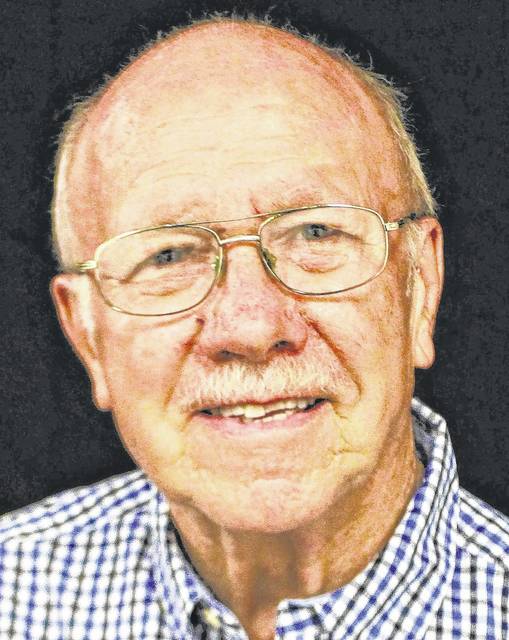
Two recent WNJ articles by locals concerning their experience with baseball and the current discussion concerning the future of professional baseball have given me no choice but to address the sport in my life and my fathers.
I have inherited the most prized possession of my father – a scrapbook mostly containing stories and photos of his involvement with baseball and softball. He passed on to me not just the scrapbook, but the love of the sport.
His honeymoon with the sport started on the last day of his senior year in high school when he pitched a no-hit, no-run game against a regional competitor in rural Champaign County. The catcher was his cousin.
A few years later he was employed at the National Cash Register Company in Dayton and was introduced in the company magazine as the boy who – you guessed it – pitched a no-hit, no-run game on his last day as a senior in high school.
Dad was sure that I could and would follow him in this pursuit, but I was always a small kid and seemed to doubt my abilities. Anyway, at 11 years of age as the youngest and smallest player, I was part of the Brookside Park PAL Club (Police Athletic League) in Indianapolis, and because of my size I was the prized lead-off batter.
I was small enough that I was difficult to pitch to, which also meant that there was a good chance that I would receive a walk or be hit by a pitched ball — this happened much too often! (At maturity, my father was about an inch taller than I and at one time 75 pounds heavier).
My time to prove myself as a baseball player came when our Brookside PAL Club team was a shoo-in as a competitor for the city of Indianapolis championship. (“The mission of the Police Athletic League of Indianapolis, Inc. is to involve the at-risk youth of the Indianapolis community in educational, cultural, and fitness activities that will deter crime, increase self-esteem and promote a positive relationship with police.”)
There were three games that day in September 1944 for three age groups, and I played in the youngest group and subsequently the first game.
As the lead-off batter I was the first player to face a tough pitcher from the Little Flower Catholic Church team; we had played them before, but I can’t remember the outcome. The game was played at the Indianapolis Victory Field, home of the Indians, an affiliate of the Cincinnati Reds. Our season record was 25-1.
After the National Anthem, the game started with the Brookside PAL Club Cardinals at bat and the first batter (me) could have been mistaken for a mascot! The first pitch was not a ball and it did not hit me; it was a strike and I hit it over the head of the first baseman. That’s all I remember — I don’t know if I scored, if I was at bat another time, and I can’t tell you another thing about the game except that we won the city championship and I had one of the happiest fathers in North America.
An aside from this world-shaking event — much like the shot heard around the world for the life of this small player — was one of the pitchers for the third and oldest players. His name was Carl Erskine. Serious followers of baseball would know the name and possibly some details about his career.
He was “a former right-handed starting pitcher in Major League Baseball who played his entire career for the Brooklyn and Los Angeles Dodgers from 1948 through 1959. He was a pitching mainstay on Dodger teams which won five National League pennants, peaking with a 1953 season in which he won 20 games and set a World Series record with 14 strikeouts in a single game. Erskine pitched two of the NL’s seven no-hitters during the 1950s.”
This is not the end of the story … Besides being an author and businessman in retirement, Erskine coached a college baseball team where I had attended and had played one year on the team as a pitcher (his coaching was many years after I had graduated.)
By being invited to a dinner many years after my graduation and Erskine’s retirement from coaching, I was told that he would also be at the dinner. Wow, my opportunity to meet him and swap stories about the day in September of 1944 when we were both on teams that had won the Indianapolis city baseball championship.
Well, after the dinner came to an end and I was told which of the attenders was Carl Erskine, I approached him and told him my story. “I was the lead-off batter in the first of the three games at Victory Field in Indianapolis and hit the first pitch and our team won the city championship — just like his team won the third game and was crowned city champions.” I even remembered the name of his team – he pitched for Blue Ribbon Ice Cream!
Well, his response and interest in one of the greatest events of my life was, to say the least, uncaring and tactless. He was not impressed that I remember his playing for Blue Ribbon Ice Cream, that we were both members of a 1944 Indianapolis championship team, or that I started the whole series off at Victory Field with a hit over the first baseman’s head.
My response to this encounter was simple – he really was not a very good pitcher, was much overrated, and his pitching records are undoubtedly fraudulent. (Recovery from traumas can lead to very interesting conclusions!)
If the editor of the WNJ agrees (Editor’s Note: I do), this will be part one of a two-part series concerning the centrality of sports, rationalization and identity!
Neil Snarr is Professor Emeritus at Wilmington College.


